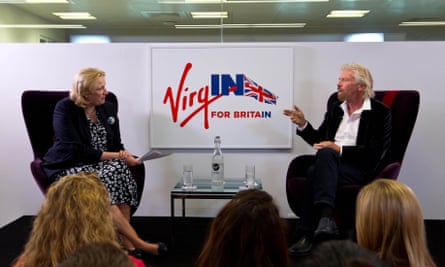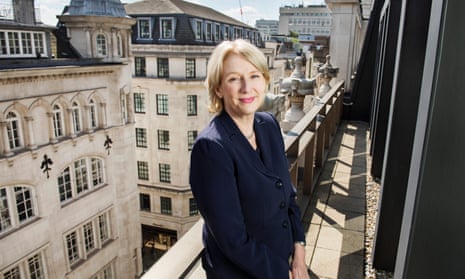When Jayne-Anne Gadhia was once turned down for a promotion, her boss provided two reasons for his decision: she lacked a thick skin and the ability to bullshit. Twenty five years on – and after making it to the top of the banking sector to become chief executive of Virgin Money – Gadhia reckons she still doesn’t possess either of those characteristics.
Rather than growing a thick skin, Gadhia sticks her fingers in her ears to illustrate her own “la la la” approach to put-downs. And she insists her motto of “ebo” (wanting to make everyone better off) is not nonsense.
“I hope I haven’t got a thick skin and don’t bullshit,” said Gadhia in her office above one of Virgin Money’s branches – which the lender insists are called “lounges” – just off London’s Piccadilly. “That’s for somebody else to judge. I do think the culture that required [those characteristics] has changed.”
The anecdote is one of many in Gadhia’s autobiography, The Virgin Banker, in which she also talks candidly about her battle with depression, particularly after the birth of her daughter Amy in 2002, after six attempts at IVF, and again three years ago when she had to suppress suicidal thoughts at the same time as Virgin Money was preparing for a stock market flotation.
“I judge my own mental health these days by my weight. I have battled with it all my life,” she writes in the book, the proceeds of which are going to Heads Together, the mental health charity that has recently been benefiting from the high-profile support of the Duke and Duchess of Cambridge and Prince Harry.
“When I am slim and physically fit, then I am in good shape mentally,” says Gadhia. “And when I am struggling mentally, I decrease the running and increase the chocolate. But, if that is as bad as it gets, then I can manage – despite the wardrobe problems this creates.”
Gadhia says that revealing her mental health problems was not the purpose of the book, which she wrote on her Blackberry during last year’s summer holiday. The idea was to tell the story of Virgin Money, which is backed by Sir Richard Branson. The business started in 1994 when the insurer Norwich Union – her then employer – linked up with Branson’s Virgin Group to launch a savings and pensions product.

In 2001, part of Virgin Money was taken over by Royal Bank of Scotland and Gadhia went with it. But she quit in 2006, blaming the culture at the Edinburgh-based bank and returned to the core Virgin business..
At RBS she claims she raised the alarm about accounting issues, the sale of payment protection insurance, and rejected attempts to package up mortgages in the style of securitisations which were later to be the undoing of Northern Rock, the bank that was nationalised in 2008. Gadhia eventually took over the “good” part of Northern Rock in 2011.
With hindsight she points to four reasons for RBS’s demise: it grew too quickly; did not have enough capital; lacked diversity at the top – run by “white Scottish men”, she says; and developed a culture where managers thought they were masters of the universe.
The RBS bankers also partied hard, she says. Gadhia tells how she saw bankers with blisters and bandages on their thumbs after setting them alight in sambuca drinking games – events she did not attend – and describes a female colleague who believed she was expected to sleep with her manager.
Her personal profile rose after the Northern Rock deal. More accustomed to being an outsider trying to break into the City establishment – at one point in the interview she describes herself as “this rather strange woman” – Gadhia sat next to George Osborne when he was delivering his high-profile Mansion House speech two years ago, was one of David Cameron’s business advisers, and still leads a Treasury-backed initiative to boost diversity in financial services.
She was also a vocal supporter of the Remain campaign, but she insists she is not now a “remoaner”. While Virgin’s shares lost a third of their value in the immediate aftermath of the EU referendum, they have since regained much of that dip and are back above their float price. The bank’s first-quarter results on Tuesday will be an indicator of any hit from the Brexit vote.

Gadhia says that in writing the book “I was learning quite a lot about myself” and that to be successful, you need supporters. In her own case, a key supporter was the late Sir Brian Pitman who ran Lloyds Bank before becoming the chairman of Virgin Money after he retired. Unsurprisingly, she names Branson as another supporter.
About once a year she visits Branson’s Necker Island home in the Caribbean and she clearly admires the serial entrepreneur who appeared via video link at this week’s book launch – held in the Virgin Group’s Roof Gardens in Kensington, west London.
“All of this – I hope this doesn’t sound naff, the whole thing is a privilege. I’ve got a completely normal background, with working-class parents, married to a guy who didn’t have shoes to put on his feet when he came to this country from Kenya at the age of nine.”
Her husband Ashok – she took his name on marriage – gave up his career to look after their daughter. Gadhia draws upon their experience of being a mixed-race couple for her hopes for women’s’ equality and mental health.
She wants those issues to become as unquestioningly accepted as her mixed race marriage now is. “Over the 30 years Ash and I have been married that change has been profound.”









